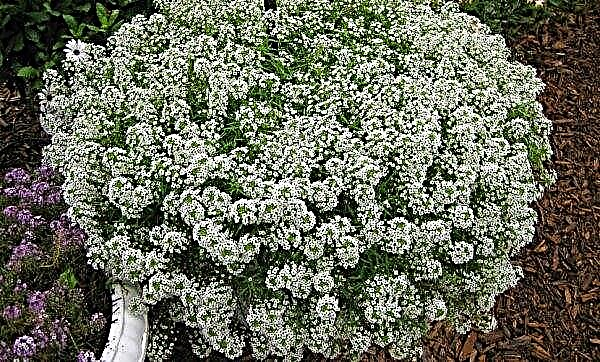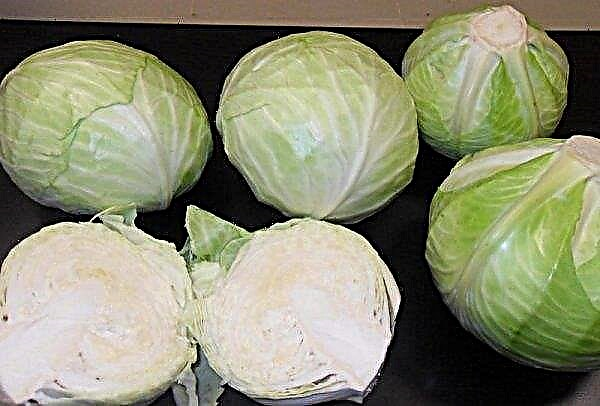Ginger has long been used in the treatment and prevention of various diseases, in particular, with abnormalities in the digestive tract, such as nausea and vomiting. Read more about the mechanism of action of substances that make up the spicy root on the body, the benefits, possible harm and the rules for using the plant against nausea, read on.
Ginger as a folk remedy for nausea and vomiting
The root crop under consideration has a fairly extensive range of uses. It is used as an antiemetic during pregnancy, motion sickness, and after chemotherapy; spice is effective in eliminating flatulence.
Did you know? Hindus produce as many as 4 grades of flour from ground ginger.
The mechanism of action of ginger
- The mechanism of antiemetic effect when consuming this product is based on:
- acceleration of metabolism;
- the rapid removal of excess fluid, toxins in a natural way;
- relaxing smooth muscles, which helps relieve spasms and pain;
- improving blood circulation;
- anti-inflammatory action.
To the end, the mechanism of action of plants on the body has not been studied. Various studies are currently underway in this area. However, it was precisely able to establish that the root crop in its composition contains a whole group of biologically active substances that have an antiemetic effect - gingerols, which cause a burning, tart aftertaste.

They stimulate the body's production of gastric juice, due to which unpleasant symptoms are removed. Besides, gingerols provide an increase in blood pressure, which positively affects the human condition with a sharp decrease in pressure. Positive effect on the central nervous system, stop headaches and dizziness.
Can ginger tea provoke nausea, vomiting
In certain circumstances, tea with ginger can cause nausea, followed by vomiting. This happens if, when consumed:
- features of their own body were not taken into account - the presence of contraindications for use;
- Recommended daily allowances have been exceeded;
- at the time of admission, an increase in body temperature or blood pressure was observed.
Did you know? Ginger in many countries is an aphrodisiac. It is believed that it positively affects male sexual function and improves sperm quality. In Japan, this product is a must-have treat for Masculinity.
Cooking recipes
Ginger root can be used in various culinary interpretations. A medicinal drink is prepared from it with the addition of various spices, herbs or fruits, which provide an additional therapeutic and tonic effect. You can also enter it into your diet in a pickled form.
Tea with mint and lemon balm

0.5 L20 minutes
Nutritional value per 100 g:
- Boil 250 ml of water.
- Pour boiling water over the raw materials.
- Insist 10 minutes. Strain the liquid.
- Add 250 ml of pure water.
- To drink in small sips throughout the day, when he begins to feel sick.

Pepper and Lemon Tea

250 ml20 minutes
ground red pepper
on the tip of a knife
Nutritional value per 100 g:
- Squeeze the juice from half a lemon into a cup.
- Boil water, immerse ginger in it. Insist 5 minutes, covering the vessel with a lid.
- Add pepper, a little zest to the drink.
- Drink in warm, small sips.

Pickled Ginger Salad

120 minutes
pickled ginger root
15 g
Nutritional value per 100 g:
- Dice the fruit into cubes or circles.
- Add ginger, mix.
- Heat the lemon juice slightly, to about + 30 ° C. Dissolve honey in it.
- Sprinkle salad with the resulting dressing.
- Consume for 1-2 hours, a little.
Important! Ginger salad should be prepared immediately before meals. Do not store the dish for more than 4 hours.

Contraindications ginger
The use of a plant product as an antiemetic has a number of contraindications and limitations in use, depending on the individual characteristics of the organism of a particular person.
So, if there is a history of certain allergic reactions, deviations in the work of the gastrointestinal tract, it is worth completely refusing to take the considered traditional medicine. During pregnancy, you should be more careful about consuming a spicy culture.
- In addition to the individual characteristics of the human body, contraindications to the use of ginger are:
- fever;
- unstable blood pressure indicators;
- children under 6 years old;
- skin problems
- poor blood coagulation;
- increased nervous excitability (neurosis, sleep problems, etc.).
Allergy
Ginger is a herb that includes a large number of compounds that can cause allergic reactions. Essential oils act as such components, which in their composition are similar to esters of ragweed, wormwood, mint, watermelon, citrus and a number of other plant crops.
 Depending on the severity of the allergy, reactions can occur immediately (15-60 minutes after eating) or delayed (after a few days)
Depending on the severity of the allergy, reactions can occur immediately (15-60 minutes after eating) or delayed (after a few days)
In this regard, if you do not know if you have an allergic reaction, you should always first conduct a wrist test. To do this, you need to take a raw root and rub it with skin on the indicated area. If after 2 hours of the reaction in the form of redness, itching is not observed, you can use the plant product for food (in very small doses).
- With an immediate reaction, the following pathological conditions may appear:
- swelling of the mucous membranes of the eyes, mouth, nose;
- copious discharge of tears; clear, watery mucus from the nose;
- blue area of the nasolabial triangle;
- wheezing, accompanied by wheezing;
- Quincke's edema;
- vomiting
- a sharp increase in body temperature;
- cramps.
If symptoms such as severe shortness of breath, swelling of the mucous membranes occur, an “Suprastin” injection should be given immediately. Then call an ambulance.
With a delayed reaction, symptoms will develop slowly. On 1-2 days after consumption of ginger, frequent sneezing, tearing, and abundant mucus from the sinuses may appear.
 If you do not stop taking the herbal product with these symptoms, after 3-4 days the bronchi will begin to cramp, which will become an obstacle to the entry of air into the lungs and the removal of mucus from them. As a result, the development of pneumonia, blind lung syndrome, etc., is possible.
If you do not stop taking the herbal product with these symptoms, after 3-4 days the bronchi will begin to cramp, which will become an obstacle to the entry of air into the lungs and the removal of mucus from them. As a result, the development of pneumonia, blind lung syndrome, etc., is possible.
In connection with the above, anyone who has a history of allergic reactions, asthma, before using a spicy plant, should consult an allergist.
Gastrointestinal problems
The basis of the antiemetic effect of the product in question is an increase in the intensity of the secretory functions of the gastrointestinal tract.
- In this regard, the root is contraindicated in:
- gastritis with high acidity;
- ulcerative pathologies;
- enterocolitis;
- impaired gallbladder and liver function;
- kidney dysfunction.
Reactions in the form of diarrhea, vomiting, severe pain may occur. With such manifestations, you must immediately contact a medical institution.
Pregnancy: features of use and restrictions
Not for all women the product in question will be useful during pregnancy. The use of traditional medicine using ginger root should be abandoned for those who, even before conception, noted product intolerance. If there was no intolerance to the product, there are no problems with blood coagulability and blood pressure, and pregnancy at the initial stage is accompanied by toxicosis, you can try to introduce vegetable tea into your diet (in small doses).

In the third trimester of carrying a baby, using tea with ginger is completely contraindicated. The product has a hemorrhaging effect, and also increases blood pressure, which can lead to internal bleeding, provoke premature birth with all the ensuing consequences for the mother and the baby.
Important! Before using ginger as an antiemetic, be sure to consult your family doctor.
Ginger rhizome helps to get rid of such an unpleasant manifestation as nausea and vomiting with toxicosis in the early stages of pregnancy, motion sickness while traveling on various modes of transport, after chemotherapy. Starting treatment, you should take into account the individual characteristics of your own body and not exceed the daily intake rate.












